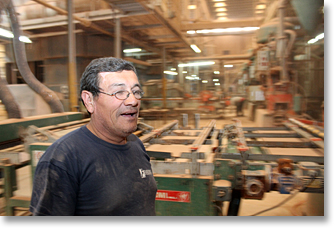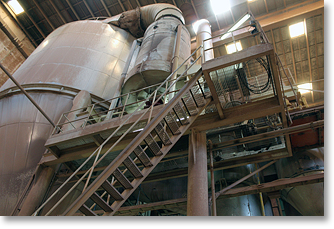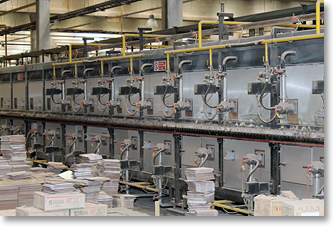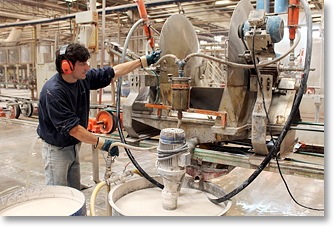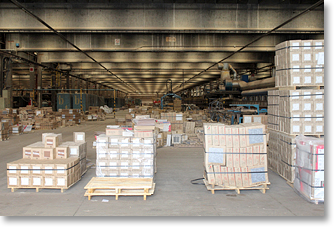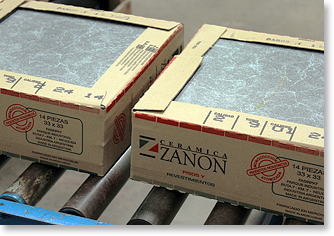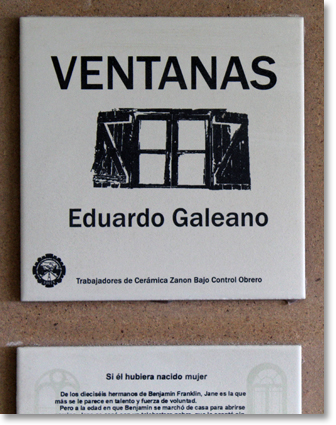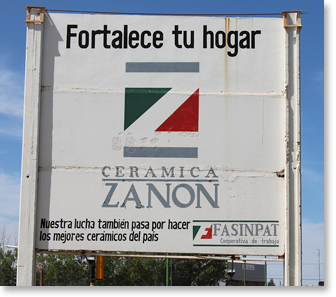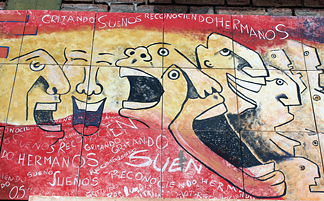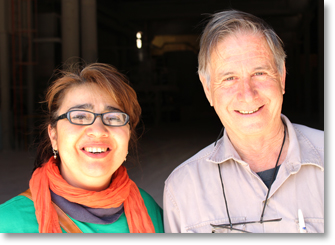|
An Interview with Jorge Bermúdez
FaSinPat (Factory Without Bosses) and Zanón Ceramics Cooperatives in a Capitalist Society Neuquén, Neuquén Province, Argentina
Aquí para leer en español. Interview Quick Links:
In Motion Magazine: Can you tell me a little about your life and how you came to be working here? At some point in the 70’s I became an activist. I became an activist in the social movements that existed in that era which were influenced by the French May uprising and the Cuban revolution. We Argentinians who saw or who believed in a change, in creating a socialist world, a world of equality, we thought that we were going to find it around the corner. Unfortunately, around the corner we were met with the torture and bullets produced by the dictatorship which began in 1976. And they weren’t guerrillas who they had massacred. Rather, an important social movement was massacred, murdered. They were killing, making disappear, factory delegates, university students, high school students. Also the Catholic Church, which had many of its practitioners doing work in the villas (barrios), teaching, doing community work -- they killed them also. That is to say, anyone who advocated a more solidarity-based vision of the world was dead, imprisoned, or disappeared. That’s how I arrived at Zanón. I began to work at Zanón in ’85. It was the most important factory in Neuquén. The peace of the dead and de-industrialization In Motion Magazine: Can you talk about the history of Zanón before the struggles? Jorge Bermúdez: Yes. Zanón was established in the midst of the Galtieri dictatorship (General Leopoldo Fortunato Galtieri took over as head of the army, of the military junta. The junta was composed of Galtieri, Lambruschini and Graffigna.)The factory was set-up in 1980. If you read the chronicles of that time, it says that Zanón was set up in Neuquén for two reasons. One, for the deduction in taxes that it was being given, for the subsidies. And two, for what the dominant bourgeois called the “social peace” that there was in Argentina. The “social peace” is the peace of the dead, the peace of people with poor wages for many hours of work. Zanón was the first single-firing (ceramics) plant in Argentina. Before single-firing, the biscuit was fired, then glazed, then sent to production. With single-firing the biscuit is pressed and glazed simultaneously, and then the production process is completed. Zanón was a plant that was built thanks to loans from the nation (long-term loans with a low rate of interest; exclusively for the friends of the governing power), loans from the province, loans from the World Bank. And it was a factory that up until the ’90s was investing permanently in technology. So, from ’88/’89, throughout the process of neoliberalism imported by the Chicago Boys and the Harvard Boys, and in the decade of the ’90s, with the intensification of the neoliberal policies, there was created also a process of total de-industrialization of the country and an emptying of factories. And into this process came the owners of Zanón. Threatening to close the factory was another way to lower wages They came in to empty out the company. They would ask for loans and then in some way they would extort the various governments. They never paid back the loans. That is to say, they were pushing out the oldest workers; they were hiring new workers at lower wages after removing all the oldest. In this way, they were lowering management costs. In this process there were various events, but above all the moment arrived when Zanón filed for bankruptcy and sent telegrams firing all of the workers and telling us to turn off the ovens. But when the factory was closed we stationed ourselves at their gates asking to be re-hired and asking for the re-opening of the plant. Then, there was a judicial verdict whose ruling coincided with the idea of the workers that the enterprise was not bankrupt. We were saying that, “It can’t be that Zanón is bankrupt because a month ago we were doing extra hours of production. We were working extraordinary hours.” That same judicial decision ruled that (the closure) was a management lockout; that is to say, a strike by the bosses. The judge also granted us the care of the plant because apparently aside from the emptying out of materials, they wanted to take away the machinery. The judge (she) left the machines in our custody And so we continued hoping for eight months that Zanón would reopen the plant. We took over the factory and began to produce In eight months it did not re-open. We lived on the solidarity of the workers, and especially those in the poorest barrios of Neuquén. It was a time of labor crisis in Argentine society. There were considerable struggles to maintain job positions. And we spent eight months in tents, at the forefront, waiting for Zanón to reopen the plant. But it never happened, so, at a certain point, necessity indicated what we were to do. Either we were out of work with an unemployment subsidy, which was at that time 150 pesos a month, or we went in, we took over the factory, and begin to produce. That’s what we did. Not all of the 450 workers who had been there went in, 250 did. The others considered themselves fired. Among those who considered themselves fired were all the supervisors, the engineers, the purchasers, the sales people, the laboratory workers. All those left, and all those of us who were in production went in to work. Yes? And we said. “Good, we are going to begin to produce.” When we said we are going to get the plant started, it was necessary to turn on the ovens, there was a complaint from Zanón saying that we were going to make the factory blow up because we didn’t know how to do the job. So we said, “If we used to turn the ovens on and turn the ovens off every day, why can’t we turn them on and off now?” Anyway, we had a meeting with the engineering faculty of the University of Comahue (which has a branch in Neuquén). They advised us and it was approved by the gas distribution company. The only surprise in this process was that half of the gas installations in the factory were illegal. When a plant or a house wants to add a gas installation, you must make a plan and you must present it for approval to see if it is in accordance with the standards set by the gas company. One half of the installations in the plant did not have approved gas installation plans. And so, we began to produce. The first 5,000 meters (of ceramic tiles) went as expected; they were produced with raw materials that were here. Then, when we ran out of raw material (clay), the Mapuche comrades (editor: The Mapuche are Indigenous people of central Argentina and Chile) gave us clay. In appreciation of the Mapuche comrades who permitted us to mine clay from their territory at no cost, we produced a series of tiles named Caciques, Kalfurca, Fermin Maripan and decorated them with the symbols of the Mapuche world view. The Neuquén community supported us Anyway, it is necessary to recognize that we had eight eviction orders to throw us out, despite the fact that we were already producing. That is to say, it was necessary for the police to come to evict us. But we always resisted, and they weren’t able to evict us because the Neuquén community supported us. In the last eviction attempt, on April 8, 2003, the state employees unions and the teachers of Neuquén declared a strike and surrounded the factory in solidarity. There were about 5,000 comrades who came from Chos Malal (northern Neuquén province), and from Zapala (central Neuquén province) to support this struggle. That is to say that the Zanón struggle was not an individual struggle of the workers, it was a struggle of all the community for dignity and for jobs not only for the city of Neuquén, but for the province of Neuquén, and many other places in the country. This prevented the trustees (the receivers) from taking possession of the factory. In Motion Magazine: Can you talk more about the connection between the community and the factory? Jorge Bermúdez: From the beginning, the idea was that the factory wasn’t going to be for us, that it was a project of our expropriation, that the factory should be a state enterprise under the control of the workers. The expropriation law presented by us to the state was a law to expropriate without compensation, to nationalize it, and put it into production under the control of the workers in order that this enterprise, besides being able to sell products, could supply all sorts of projects in schools and hospitals in the provinces of Argentina. Why did we say this? Because when everyone was saying that here in Argentina, when expropriation without payment is being talked about, they say “that’s craziness, it can’t be done.” But, yes it can be done in Neuquén because the constitution of Neuquén says it is possible to expropriate without payment if that business has not fulfilled the social objectives it was established for. There are very important facts about the era of struggle in the community that we united with. It wasn’t that we, in Zanón, when we were working in Zanón, were the defenders of the struggle, the guardians for solidarity. No, no. We complained when the teachers were cutting the bridge. We complained because we were well paid and we had a whole internal social system that was very screwed up, we weren’t able to get together with fellow workers from other internal sectors of the company. So, when the plant was closed and we were left without money to face the expenses of family life, to go out to ask for food was a challenge. It was a whole mental change for us to know that there were people in solidarity with us. We had never experienced this before. This changed the minds of many fellow coworkers. Though, obviously, it didn’t change everyone’s. The teachers of Neuquén were sending notes. The kids in elementary school and high school have what we call “communication notebooks” where they would express; “Please, could each family donate a kilo of sugar, a kilo of noodles, something non-perishable for the workers of Zanón.” They were doing this and in that way we were able to gather. We were able to endure for eight months without working and without getting paid; we lived on the united assistance that they gave us. And, contrary to what you and I might think, the most humble people contributed the most. In particular, the first kilos of noodles, yerba, and sugar came from a neighborhood that is near here that is very poor. Also nearby is a prison, and in Argentina it is the same as in the United States, the prisons aren’t for rehabilitation but for social punishment. They, they donated to us three days ration of food so that we might eat. That is to say that these gestures of solidarity are very important and we cannot forget that, and it is because of this that we have a permanent relationship with the Neuquén community – with the young people, with the teachers. Because of this we unite with them in all of their struggles. We always said that the ceramic was of the people, for them. Every month we make donations of flooring and other ceramic coverings from what we produce to the schools, to the libraries, to homes for indigent people, to people to whom the government normally offers no solution. For example, there is a neighborhood in front of the plant. For 15 years they had been asking for a place where a public health doctor could come. A health center is there now -- built by us and the neighbors. In Motion Magazine: Do you have a connection with your products after they leave the factory? For example do you maintain relations with the people who buy your ceramic tiles? Jorge Bermúdez: Ten percent of those who buy our ceramics do it out of solidarity and political commitment to our struggle. But not everyone who buys the ceramics we produce does it for reasons of political commitment to the struggle that we carry forward, they do it because it is a quality product and the price is competitive. To make known our struggle and ideas we travel to certain parts of the country and abroad and explain our experience. It is very difficult to make revolution in only one country. Often Lenin said the Russian revolution was connected to the triumph of the German revolution. To maintain worker control of the factory with a horizontal and democratic leadership (or guidance) costs us a lot, and it cost all recovered factories in the world of capitalist companies. (Editor: factories/businesses in which the workers have been able to save the factory and run it as a cooperative.) If the World Bank tells me to form cooperatives, which is a form of production that is contrary to the capitalist system, I would say, “They are deceiving me. It’s some kind of trap?” since in the world there is too much, and always more, unemployment and misery. And they say to you, to us who are excluded, “Form yourselves into cooperatives, get to producing floor-coverings,” -- small productive entrepreneurships that aren’t going to guarantee you survival -- but they give you the first monies so that you can make those enterprises. Afterwards, you are left adrift and things go bad for you because they don’t guarantee you a sale. They don’t guarantee you a price. You must enter the competitive market and when things go bad for you, they say to you, “But I already helped you.” That is, they say to you, “You are responsible for your own misery.” You don’t know him, but here in Argentina, El Gordo Valor is one of Argentina’s emblematic criminals -- robbing banks and robbing houses. If El Gordo Valor tells you, “Sleep peacefully with the door of your house open,” I am going to be suspicious. And, when the World Bank tells me, “Form cooperatives,” which is contrary to what they favor as a form of capitalist, individualist development -- there is some trap. And the trap is in that you are going to be responsible for your own misery. There is only one way that cooperatives with horizontal and democratic leadership can have a happy ending and that is by changing the education system at all levels. It’s not enough to just teach what is a cooperative or to have a day to carry out an action in school, a day of cooperativism, or a class on economic socialism, if the rest of the curriculum and the social structure of education is individualistic, generating an individual prepared for individual competition; that he who triumphs in society is he who has the most, he who consumes the most. In Motion Magazine: How many people are there in Zanón? Jorge Bermúdez: Today we are 465 people, more or less. In Motion Magazine: Is that just workers in the factory, or does that include people outside the factory as well? Jorge Bermúdez: All of us who start working here. After three months, we become members of the cooperative. You are a full member and have access to all job positions. Let me explain how our organization works. Our highest decision-making body is the assembly. We have monthly assemblies where important general guidelines for the factory are discussed. And from there work strategies are developed. At the same time, on a daily basis, there is a normal pyramid where the general coordinator of production is also the president of the cooperative, because legally we have to have a directing body of the plant. So, the president is the general coordinator of the plant and we have coordinators instead of supervisors in each sector. The coordinators and the general coordinator are elected in the general assembly. The sector coordinators are elected in their sector and can be recalled by an assembly at any time. Also, there are sectors that have an obligation to rotate: the sales, purchasing, and administration sectors; the fellow coworkers that are in that sector rotate every two years. They have an obligation to rotate. If we decide so, a person can continue, he or she is voted to remain, and he continues again in the same sector. That, from a capitalist point of view, is an aberration because you have trained a fellow coworker from sales, from purchasing, you have trained a fellow coworker in administration. But rotation permits us all to learn how to see production from another angle, from another point of view; to avoid the bureaucratization of some important sector of the factory. That also, we brought to the union. I don’t know how things are in the U.S., it must be the same as in Argentina, where there are people who haven’t worked in 30 years -- and they are the secretary-general. We here have modified the union rules and nobody can be in any responsible position in the union for more than two terms. This also prevents bureaucratization. We have here working in the factory three fellow coworkers who were secretary-generals. They are working on the line, as they should. In Motion Magazine: In what sector of the factory do you work? Jorge Bermúdez: I’m in the porcelain laboratory, the laboratory, in production. In Motion Magazine: Do you have a title at this time? Jorge Bermúdez: A title? Here in the factory? In Motion Magazine: Yes. Jorge Bermúdez: No. In Motion Magazine: The title “Jorge”? Jorge Bermúdez: “Jorge in the Laboratory”, the little bird in other circles. I was in the union, and I was a coordinator. In Motion Magazine: What is it like to change? Jorge Bermúdez: It is important that we change, because, as I say, when you come from a different position you have another viewpoint and you communicate it. In Motion Magazine: Was it important for you personally? Jorge Bermúdez: Yes. Important, yes, yes, yes, yes. In Motion Magazine: For yourself, how would you describe the benefits of rotation? Jorge Bermúdez: Well, there are many and it depends on each one of us individually, on our own particular interests, and some can benefit more and some less. If you like to learn, to investigate, you benefit much more. For me, it has been a new world. For example, I have travelled to Greece; I have given talks in Greece about our experiences. For example: when we ran out of clay for our porcelain, which is brought 2,000 kilometers to Neuquén from San Julian, the provider said to us, “We won’t sell to you.” So we said, “Fine, then we will have to look for someone else who will sell to us.” And we went to a nearby clay field and we investigated who the owner was. We began to search. I learned how to survey the terrain and to determine if the clay would be adequate. That is to say, I learned about politics, in addition to the technical aspects. I used to be the type who would say four words and then I would leave. And now, here you have me talking for three hours and I can continue talking for an hour more, telling you things. For me, this has been a pipe dream. But it literally depends for each one of us -- and after work you must go home and continue reading. In Motion Magazine: How many people have left Zanón? Jorge Bermúdez: About fifty to one hundred people have left. And almost all have left because of monetary problems. It is very difficult to compete with oil industry wages in Neuquén. And we have serious technical problems because of that. For example, Zanón must be, despite what has not been done, the factory with the best electronic technology in all of the Neuquén industrial park. When you take on an electronic engineer and he comes for a year, two years, or an electrical technician, he learns here then he becomes the one who knows how to solve our problems -- but outside he is a senior electronics engineer. Because of this we have problems: the oil industry takes him away. Fundamentally, it’s a problem of money. It’s the same with state employees -- they can go to the oil industry where they earn three of four times more than here. It’s another life, but they earn much more money. That is one of the unfortunate reasons why they leave. Apart from that, there are a few, ten to twelve people, who we have asked to retire from the cooperative. That is to say, when there is a fellow coworker who is not meeting the norms of coexistence, the norms of production, first he is warned and then he is suspended. And, if the conditions aren’t met, then he is expelled from the cooperative. To do that, first there is a vote in one of the monthly meetings that I was telling you about. It is explained why it is being proposed that the fellow coworker be expelled and the compañero has the right to respond. Then there is a vote to decide if he goes or he stays. We have done some things for example, that is very interesting, there was a fellow coworker who was an alcoholic, he was asked many times to go through the treatment so he could be cured of his alcoholism, and he never did it. And so we asked that he retire because it was a problem for the cooperative. But so that his family would not be left without sustenance we brought his mate in. His wife began to work at Zanón. In Motion Magazine: What percentage of the members of the cooperative are women? Jorge Bermúdez: I believe there are forty women coworkers, so that’s 10 to 15 percent. In Motion Magazine: Why aren’t there more? Jorge Bermúdez: There were many fewer women. They began to be incorporated a little at a time. The women who have joined, some are in the union, some are in administration, in sales, in the kitchen, in production. But despite all that we are not “the new man”. We continue with the machismo. We have tried to improve the situation of the compañeras here in Zanón and I believe that we have come along well, working side by side with the women coworkers. And in general, the women working on the production lines are much more efficient than the men; they are much more meticulous in the work -- and that is a great thing. In Motion Magazine: Can you talk a little more about how things were during the months that you were outside the factory? The occupation? How was life for you and the others? Jorge Bermúdez: In reality, it was a very difficult time for us because, as I was telling you, we came from a sector of privileged workers in Neuquén. Especially the older workers were very privileged; the newer workers not so much because there had already been a process of creating job insecurity. And from 1989-90 there had been job insecurity in Argentina, including here in Zanón. You understand? The worker was no longer coming into a permanent situation but was contracted. Regardless, we had a secure job. To work in Zanón was a privilege and then to find yourself in the street from one day to the next is a hard blow; you find yourself without having anything to eat. There was a very important crisis for the families. Some families actively supported the workers. The wives of the workers built an organization which was the Committee of the Women of Zanón. They gave great support and it was very good for their fellow coworkers to know that he had the support of the family. There was a very deep crisis in the families because to be the usual provider, as it was in Argentina, and then to not provide anything more than the food and a kilo of yerba or the ten or 20 pesos that we were able to get from the strike fund ... . They were very hard months for the fellow coworkers. Very hard. Very hard. After that came a process of beginning to work and to collect what could be distributed, until a more or less dignified wage could be obtained. It has been since 2004 that the production has increased enough to have a fair wage. After 2004 we began to work legally with the cooperative and things went very well economically. We invested a lot of money in maintaining the factories. But, in the crisis of 2008, the result of the real estate bubble in the United States and Europe, the exporting ceramics factories of Argentina, restricted themselves to the internal market. This made it so that for a little over a year we were not able to raise our prices because there was ferocious competition here in the Argentinian market for the placement of product. In some factories the state would pay them a subsidy, and in others they got rid of personnel. But we were all fellow coworkers and so we weren’t able to downsize ourselves. Despite having to reduce production, we were not able to reduce our costs and that created a financial crisis for us that we continue to have. In other words, we need working capital to upgrade rapidly because this is a factory with obsolete machinery. We have to buy machinery with the latest technology to be able to compete with other ceramic companies. And that is something that we have not been able to do. We have sought a loan to buy parts and to put the plant in good condition to increase production, to lower costs, and to be able to earn and survive better. In any case, we have been seeking a loan with Nación (Banco de la Nación Argentina) for a technological upgrade, to buy two new presses, a new line, new sets, that would allow us to produce with two presses what we used to produce with six presses. Then the labor cost and the cost of the product would go down and become profitable. This process lasted two years and the response was negative. Now, this is very difficult. We are making (Zanón) profitable by not growing (Zanón), by exploiting ourselves – this was not the reason that we took the factory. We didn’t take the factory to exploit ourselves, as I was saying to you previously. You see? One doesn’t form cooperatives to exploit oneself, that is not the idea, but, well, that’s what’s happening to us. A high school here in the factory In Motion Magazine: Is there anything else you’d like to say? Jorge Bermúdez: Yes. There is a whole bunch of things we could talk about, but it seems to me that there are some that are very important. It seems to me that the important and permanent struggle that we have is for public health and public education. Public health which is free, equal, and of high quality; the same with education -- free education, for lay people, and of high quality. In general, the governments are trying. But although they say they are putting a lot of money into education, I don’t see it reflected in the education quality of the young people. Sixty percent of the youth don’t finish high school. And not finishing high school means a lesser labor capacity -- so you have cheap labor. I believe that public university in Argentina is not made for workers. This is another complaint that we have. I believe that the university is organized so that the professors can teach at times that are good for them and not when the students can go. On the other hand, in a private university, which is a business, the customer is always right and so they accommodate the schedule to the student. And so the one who works is the one who ends up paying. This is a complaint that we are always making and we are fighting over with our university professor compañeros. We have succeeded after many attempts at the Provincial Education Council to create a high school that would operate in the factory. It would be something that would allow our fellow workers to finish high school because it is indispensable for us to train fellow workers to fulfill the different tasks that they need to carry out within the organization, within the ceramics enterprise. As I mentioned before, we have rotating responsibilities in administration, in sales, and so on. It is necessary to train fellow workers. Classes run from six in the evening until ten at night. Not only can the ceramic workers attend, but also any other young person here who wants to. The school is a joint project of the ceramics factory, the teachers union ATEN (Asociación de Trabajadores de la Educación del Neuquén) and the Education Sciences faculty of the University of Comahue.
|
||||||||||||||||||||||||||||||||||||||||||||||||||||||
If you have any thoughts on this or would like to contribute to an ongoing discussion in the  What is New? || Affirmative Action || Art Changes || Autonomy: Chiapas - California || Community Images || Education Rights || E-mail, Opinions and Discussion || En español || Essays from Ireland || Global Eyes || Healthcare || Human Rights/Civil Rights || Piri Thomas || Photo of the Week || QA: Interviews || Region || Rural America || Search || Donate || To be notified of new articles || Survey || In Motion Magazine's Store || In Motion Magazine Staff || In Unity Book of Photos || Links Around The World NPC Productions Copyright © 1995-2018 NPC Productions as a compilation. All Rights Reserved. |




